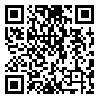
 1, Leyla Jansar Hoseinie2
1, Leyla Jansar Hoseinie2 
 , Sanaz Ommaty3
, Sanaz Ommaty3 
 , Fereshteh Golshani4
, Fereshteh Golshani4 
 , Alireza Bayat5
, Alireza Bayat5 

2- MSc. Iranian National Center for Addiction Studies(INCAS), Iranian Institute for Reduction of High-Risk Behaviors, Tehran University of Medical Sciences, Tehran, Iran
3- MSc. Department of Psychology, Islamic Azad University of Rudehen, Tehran, Iran
4- MSc. Student, Department of Psychology, Islamic Azad University of Garmsar, Tehran, Iran
5- BSc. Iranian National Center for Addiction Studies(INCAS), Iranian Institute for Reduction of High-Risk Behaviors, Tehran University of Medical Sciences, Tehran, Iran
Background and Aim: Group therapy is one of the selective approacheseffective in addiction treatment, although it is not used extensively.Therefore, it is essential to assessthe current group therapy situation and determine its barriers andreinforcing factors inaddiction treatment settings.
Materials and Methods: This qualitative study was a rapid assessment designed and conducted in 2014-2015. Formal and informal data were collectedfrom 6 selectedcenters (n=55) bya multi-disciplinaryresearch team,using a systematic and semi-structuredapproach. Data were analyzed using thematic analysis.
Results: Based on dataanalysis a descriptive model was obtained with two main items, namely, structure and implementation of group therapy and effectiveness process. These two main items were found to be composed of four descriptive sub-items, including structural determinants and effective determinants in group therapy, contextual features, content, acceptabilityand desirability of treatment.
Conclusion: The findings show that application and effectiveness of group therapy is desirable, but it is not used as a routine approach in addiction treatment centers. Barriers to expansion of group therapy include insufficient content, lack of a structured protocol, and lack of professionalcapacity building. The study also revealsthat group therapy is quite acceptableamong patients who have had the experience of being treated with this approach but less acceptable among those who are not familiar with it.
Received: 2017/03/13 | Accepted: 2017/03/13 | Published: 2017/03/13
| Rights and permissions | |
 |
This work is licensed under a Creative Commons Attribution-NonCommercial 4.0 International License. |
